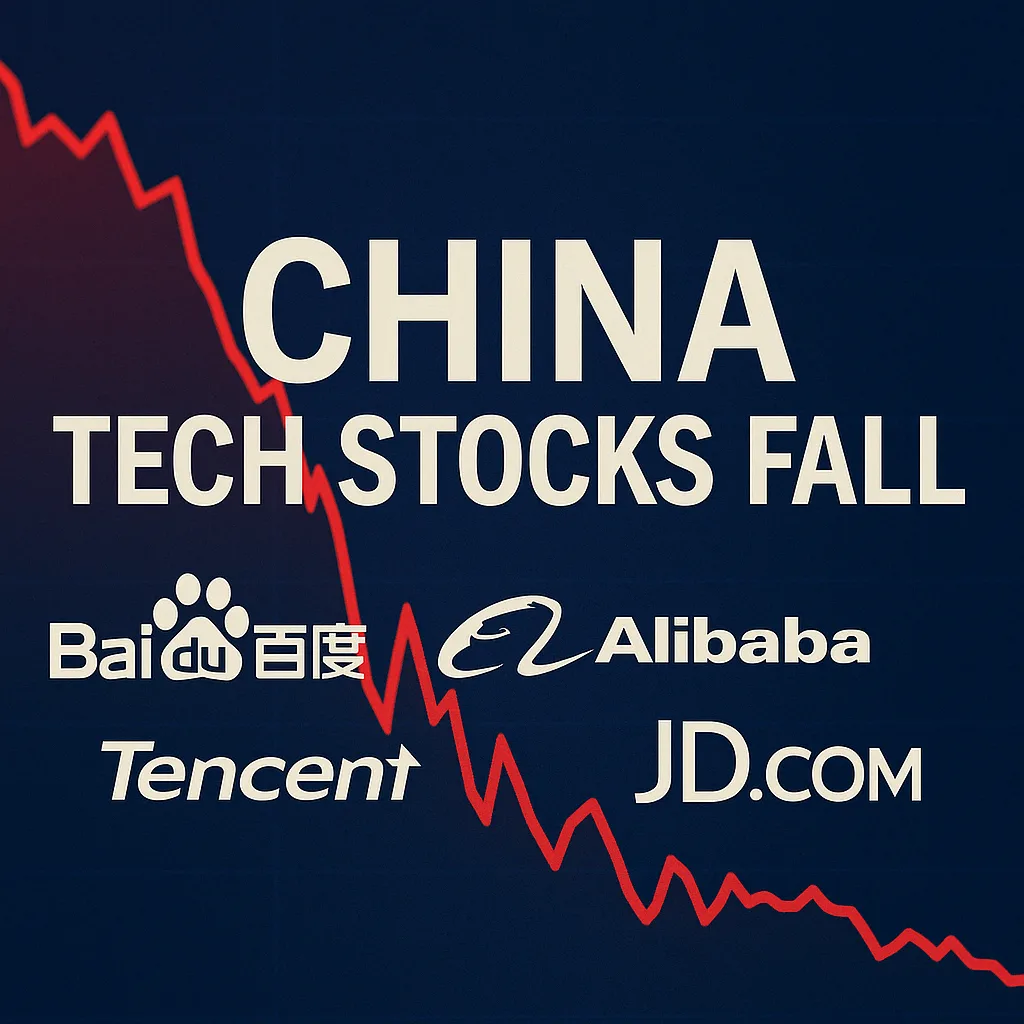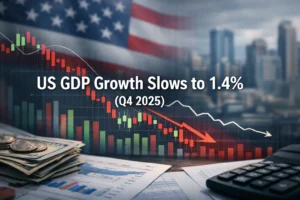Asian Tech Stocks Slide as Nvidia Reveals $5.5 Billion Hit
Asian technology stocks dropped sharply on Wednesday after Nvidia announced a $5.5 billion charge in its upcoming earnings, driven by tighter U.S. export restrictions on AI chip sales to China. The announcement spooked investors and triggered widespread losses across major tech stocks in Asia, particularly in China.
Shares of Nvidia fell over 7% in U.S. aftermarket trading. The company disclosed it will need to write down billions in inventory due to new U.S. regulations limiting exports of its H20 chip to China—a product that had been specially designed to comply with earlier export rules under the Biden administration.
China’s Top Tech Firms Hit Hard
Leading the declines in Hong Kong trading were China’s biggest internet giants—commonly known as the BAT trio: Baidu, Alibaba, and Tencent. These stocks fell between 3% and 5%. Smaller but significant players like Weibo and JD.com also saw their shares fall by 2% and 6%, respectively.
These companies are heavily invested in artificial intelligence development and rely on Nvidia’s chips to power their systems. Without access to these chips, their ability to stay competitive in the global AI race is under serious threat.
Earlier this year, Chinese firms placed orders worth over 16 billion dollars for Nvidia’s H20 chip, highlighting how critical these chips are for their AI ambitions. Bytedance, the parent company of TikTok and a key player in China’s AI ecosystem, also uses Nvidia hardware extensively. Even DeepSeek, a rising AI startup that made headlines earlier this year, had confirmed using Nvidia’s chips.
Asian Suppliers of Nvidia Also Affected
The ripple effects of Nvidia’s troubles were felt across its supply chain in Asia. Taiwan Semiconductor Manufacturing Company, one of Nvidia’s main chip fabricators, fell more than 2% in Taiwanese trade. Hon Hai Precision Industry, also known as Foxconn, also dropped by a similar margin.
In South Korea, SK Hynix—a major memory chip producer—lost more than 3%. Japan’s Advantest Corporation, a leading chip-testing equipment manufacturer, slid nearly 7% on concerns about slowing demand in the sector.
AMD Hit by U.S. Export Curbs on MI308 Chips, Faces $800M Impact
AMD has confirmed in a regulatory filing that new U.S. export restrictions to China will affect its MI308 chips. The company said it will now need to apply for export licenses under the updated rules. As a result of these controls, AMD expects to take a financial hit of up to $800 million.
In 2024, China contributed over $6.23 billion—about 24% of AMD’s total revenue—making it the company’s second-largest market. However, due to U.S. export controls, AMD now expects up to $800 million in charges related to inventory, purchase commitments, and reserves. While AMD plans to apply for export licenses, there’s no guarantee they’ll be approved, and Jefferies analysts noted that the U.S. has never granted licenses for GPU shipments to China.
NVIDIA to Build AI Chips and Supercomputers in the U.S.
NVIDIA has announced that it will now design and produce its advanced AI chips and supercomputers entirely within the United States — a major shift with big economic and tech impact. For the first time, NVIDIA’s AI systems will be made on U.S. soil. The company is teaming up with major partners like TSMC, Foxconn, Wistron, Amkor, and SPIL to build a full AI manufacturing network across states like Arizona and Texas. This move is expected to create hundreds of thousands of jobs, boost America’s supply chain security, and unlock trillions in future economic growth.
US-China Trade Tensions Add to Market Worries
The escalating trade tensions between the United States and China are adding to the uncertainty. The requirement for Nvidia to seek U.S. government licenses for selling the H20 chip may limit its access to the Chinese market in the future.
Although the H20 chip was built specifically to meet previous U.S. restrictions, further tightening may cut Nvidia off from one of its most lucrative markets. This has raised fears that Chinese competitors like Huawei may gain an advantage and take over a larger share of the AI chip market.
NVIDIA Secured $18B in H20 Chip Orders, But Kept Customers in Dark on U.S. Export Curbs
NVIDIA reportedly secured nearly $18 billion in H20 chip orders since early 2025, but failed to inform several key customers about the new U.S. export restrictions on these China-targeted chips after receiving the notification.
ASML Reports Weak Orders Amid Industry Slowdown
Meanwhile, Dutch semiconductor equipment giant ASML also reported disappointing quarterly results, further signaling weakness in the chip sector. The company reported new orders worth 3.94 billion euros in the first quarter, falling short of analysts’ expectations of 4.82 billion euros.
ASML supplies advanced lithography machines essential for chip production. While the company maintains its 2025 sales target between 30 billion and 35 billion euros, concerns are rising about a slowdown in AI-related demand due to ongoing trade tensions and tariffs.
The Trump administration recently imposed tariffs as high as 125 percent on a wide range of Chinese imports. Although certain tech products have been temporarily exempted, the U.S. Commerce Department is now reviewing the national security implications of importing semiconductor components. This investigation could lead to more tariffs and impact companies like ASML that depend on global semiconductor production cycles.
What Lies Ahead for AI and Semiconductor Stocks?
Investors are now closely watching how prolonged trade restrictions will affect the broader AI and semiconductor landscape. If U.S. regulators continue tightening export policies, more companies in China may be forced to look for domestic alternatives, reshaping the global chip market.
On the other hand, firms like Huawei could benefit from these constraints, gaining more control over China’s AI infrastructure.
For Nvidia, ASML, and other global tech suppliers, the coming months will be crucial in determining whether they can navigate regulatory hurdles and keep up with growing AI demand, or if they will lose ground to emerging competitors.

BBW News Desk is the editorial team of BigBreakingWire, a digital newsroom focused on global finance, markets, geopolitics, trade policy, and macroeconomic developments.
Our editors monitor government decisions, central bank actions, international trade movements, corporate activity, and economic indicators to deliver fast, fact-based reporting for investors, professionals, and informed readers.
The BBW News Desk operates under the editorial standards of BigBreakingWire, prioritizing accuracy, verified information, and timely updates on major global developments.


































Be First to Comment